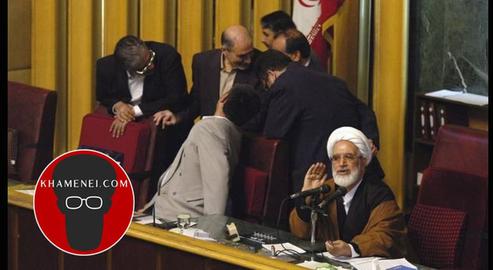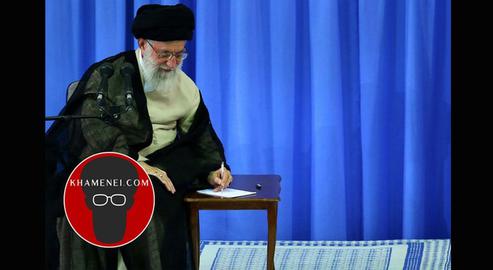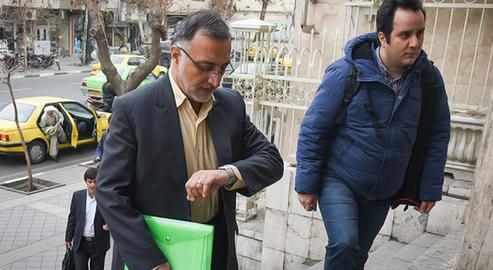How much power does the parliament wield within the Islamic Republic of Iran? Are the MPs true representatives of the people and their wishes, or they owe their seats to the endorsement of the Supreme Leader and his acolytes? In this series of articles on the relationship between parliament and Ali Khamenei, we explore the answers to these questions.
“That is what a leader’s decree means.”
These were the words of Mehdi Karroubi, Iran’s sixth Speaker of Parliament, in his rebuttal to MPs who sharply objected to the removal of a press law reform bill from its agenda in the summer of 2000. With this choice of phrasing, Karroubi was implicitly encouraging those present to accept the Supreme Leader’s point of view.
Reforming the press law was an important promise the reformists had made in their electoral manifesto. But a single letter from Khamenei had been enough to remove it from the agenda. Protests by the MPs went nowhere, but they were instructive: we learned that an unwritten law in the Islamic Republic known as the “leader’s decree” can overrule any other would-be Act of Parliament, and nobody, not even elected representatives of the people, can object to it.
Until this moment in 2000, when Karroubi first cited the “leader’s decree” in an open session of parliament, the term had been an unfamiliar one to most Iranians. It was used in discussions between faqihs (Islamic jurists) and in closed sessions of parliament, but not in public. From that day on, however, it became commonplace and was used more and more frequently to bypass the will of the legislature.
Prior to this, the views of the Supreme Leader were also seldom brought up in public agenda-setting sessions of parliament. In the few, sensitive cases in which Khamenei’s name had been cited in such discussions, other MPs would typically warn the speaker not to put their colleagues in a tight spot or deny them freedom of action by doing so. The 4th Iranian parliament from 1992 to 1996 had been completely dominated by conservatives, so there had also been little need to resort to citing the “leader’s decree” to make them behave.
Members of the 6th parliament did not usually bring up the Supreme Leader’s views either, but for more pragmatic reasons. The reformists often held views that differed from those of Khamenei, so they preferred not to mention his name. But for this exact reason, the Guardian Council also vetoed most of their more problematic and important decisions, preventing them from becoming the laws of the land.
But from the 7th parliament (2004-2008) onward, when principalists again took over the legislature, it became standard procedure to defer to the Supreme Leader’s views to argue one’s case and draw up bills. Today, anyone listening to the radio broadcast of a full session of parliament will hear dozens of references to the Supreme Leader in different contexts: almost as though the MPs represent Khamenei, rather than the Iranian people.
Leader’s Decrees vs. an Independent Legislature
From the point of view of Ayatollah Khomeini, the founder of the Islamic Republic, the leader’s decree was one of the rights granted to him by the principle of Velayat-e Faqih, or guardianship of the Islamic jurist, and therefore knew no boundaries.
“Imam or the guardian of Muslims can take any action if it is in the interest of the Muslims,” he wrote in his book Tahrir al-Wasilah (Vol. 2, P.626), “including stabilizing the price of goods or restricting specific trades and industries – provided it plays a role in protecting the system, and benefits the Muslim.”
But when such decrees turn into a tool for day-to-day governance of the country, they invalidate the people’s vote and can be used to revoke their rights. In his campaign for the 2009 presidential election, Mehdi Karroubi was asked to what degree he would defer to leader’s decrees to run the affairs of the country if he won the presidency.
“You cannot run the country through leader’s decrees,” he answered. “Were I at the head of the government I would adhere to the law and, as much as possible, I would try not to resort to leader’s decrees. But if I have to use them to protect people’s rights I would definitely do so, and I would thoroughly explain my reasons to the people.”
In other words, senior figures in the Islamic Republic then believed that leader’s decrees were the exclusive preserve of a situation in which there was no other lawful way to solve the problem. But are such decrees compatible with people’s rights and the law when it comes to MPs performing their duties?
The entrenched concepts of the rule of law and the people’s right to decide their own destiny require that the country be run based on laws passed by elected representatives. A legislature dominated by so-called leader’s decrees, in which MPs support their arguments, introduce bills and vote for or against them according to the views of the Supreme Leader rather than their constituents, violates both of these basic principles.
Is There a Need for Leader’s Decrees?
Even if we agree that the leader’s decree might sometimes be needed in extraordinary circumstances, to resolve issues that fall outside the existing laws, the question remains: is it needed in the day-to-day operation of parliament, according to the Iranian constitution?
The answer is no, for two reasons. Firstly, because the legislation passed by parliament must be vetted by the Guardian Council before it becomes law. Members of the Guardian Council represent the Supreme Leader and are appointed by him. This already makes it impossible to pass laws that might contradict the interests of the regime or the ruling caste’s interpretation of Islamic law.
Secondly, because any problems that need to be addressed without legal precedent or an existing legal remedy can be dealt with by parliament through the mechanism of emergency bills. As such, in all but the rarest of circumstances, there is no need for extralegal resolution involving anyone from outside.
After his appointment as the Chief Justice of the Islamic Republic in 2019, Ebrahim Raeesi asked the Supreme Leader to give him the authority to take special action against “financial disruptors” who were then engaged in a range of criminal activities in Iran, including currency smuggling, hoarding, and other financial swindles following the return of US sanctions.
But Ali Motahari, deputy Speaker of Parliament at time, wrote a letter to Raeesi in which he rightly pointed out that he could have gained this authority through an emergency bill.
“It would have been better for the Judiciary Chief to enact the laws that he wanted through parliament,” Motahari wrote. “The judiciary could have achieved its goal through an [emergency bill] and should not have bypassed parliament.
“Parliament could have granted the necessary powers to the judiciary to fight financial crimes for a certain limited period, under the present conditions, and the problem would have been solved. We must not use every excuse to resort to leader’s decrees. The leader’s decree is needed when there is no legal route.
“They might say that time would have been wasted. The answer is that the difference [between a leader’s decree] and an emergency bill that must be approved by the Guardian Council would have been five to seven days. This was not worth resorting to the leader’s decree. The principle is that everything must done according to the law.”
The same could have been said about the government’s budget for this year. After the coronavirus outbreak, which temporarily closed the Iranian parliament, then-Speaker Ali Larijani wrote a letter to the Supreme Leader requesting a decree that would allow the parliamentary Reconciliation Committee to pass the budget, instead of the legislature as a whole.
Khamenei agreed, and the budget was sent to the Guardian Council after gaining approval by the committee. The problem could equally have been resolved in a full, open session of parliament through videoconferencing, by means of an emergency bill.
“There can be no doubt,” Ali-Akbar Mousavi Khoeini, a member of the 6th parliament, told IranWire, “that the interference of the Supreme Leader in the lawful activities of the three branches of government – whether through leader’s decrees, or through orders from him and his office – has undermined these institutions, distorted them, and made them incompetent. After the parliament passes a law it goes to the Guardian Council, which is controlled by the Supreme Leader. So why is it necessary for him to interfere again?”
Parliament is Not the Only Compromised Body
Excessive interference by the Leader, Mousavi Khoeini adds, has not been limited to the ordinary activities of parliament. “His interference in other branches,” he says, “especially the executive branch, has turned into a weird behavior pattern.
“This is why some have put forward the idea that the presidency and the leadership ought to be combined. The leader would then directly take over the executive and, of course, would be held accountable for the executive branch as well.
“But the Supreme Leader wants an outward appearance of a republican system, which is [in fact] under his command, so that when it is necessary, he can escape responsibility. Of course, the Leadership’s countless interventions have laid bare the true nature of this system. We can say with confidence that were a referendum to be held today, the overwhelming majority of the Iranian people would vote for changing the existing system.”
Given the past, explicit public pronouncements by the Supreme Leader, does the Iranian parliament have any independence left in how it votes? “No,” says Mousavi Khoeini. “Unfortunately, with the repeated and direct or indirect interventions of the Leadership, parliamentary independence has vanished and its effectiveness has become extremely limited. Previously, the parliament could at least play a role in deciding part of the budget. But now, it frequently has no say in the decisions whatsoever, as we saw in the [2019] increase in gas prices, which led to disaster.”
In Iran, leader’s decrees have demonstrably come to be used not to solve otherwise-unsolvable problems in running the country, but to disfranchise the parliament and impose the will of the Supreme Leader on the legislative process. Back in 2015, it took the Iranian parliament just 20 minutes to approve the Joint Comprehensive Plan of Action (JCPOA), one of Iran’s most important foreign policy bills for decades, without it being opened to scrutiny by MPs and without members of the government having to answer any questions on the content.
Oral Statements as Leader’s Decrees
In the past, only written orders by the Supreme Leader to government institutions were considered leader’s decrees. But more recently, unabridged records of discussions in parliament reveal that MPs now consider even Khamenei’s oral statements to be instances of the same – and believe they are duty-bound to turn them into legislation.
On August 9, while Iran was in the grip of coronavirus pandemic and economic meltdown, the same parliament that could not have a full session to pass the budget scrambled to pass a bill called “increasing the rate of pregnancy and preventing the fall in population growth”, outlawing surgeries to sterilize men and women and enacting punishments for doctors who violate this law, up to and including a ban on practicing medicine for life.
Why? Because Khamenei had repeatedly stated in speeches that he wanted the population of Iran to double and that having many children should become part of the country’s “culture”. More explicitly, on June 4, he had ordered the Interior Ministry to create a workgroup to encourage Iranians to procreate.
Leader’s decrees, and elevating the Supreme Leaders’ views over those of the people in the legislature, contravenes the idea of a republican system of government, democracy and people’s rights. Nevertheless, those who believe that leader’s decrees are above the law now occupy almost all the seats in parliament, and unabashedly play their ascribed roles in the circus called “guardianship of the Islamic jurist”.
Related coverage:
Khamenei.com: Disenfranchising the Parliament, Part One
visit the accountability section
In this section of Iran Wire, you can contact the officials and launch your campaign for various problems




























comments